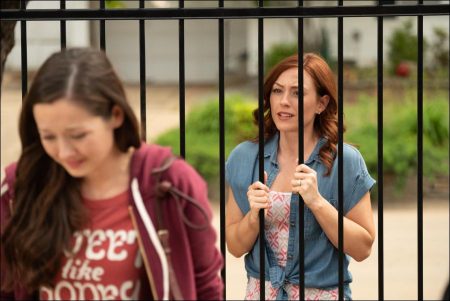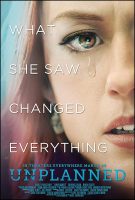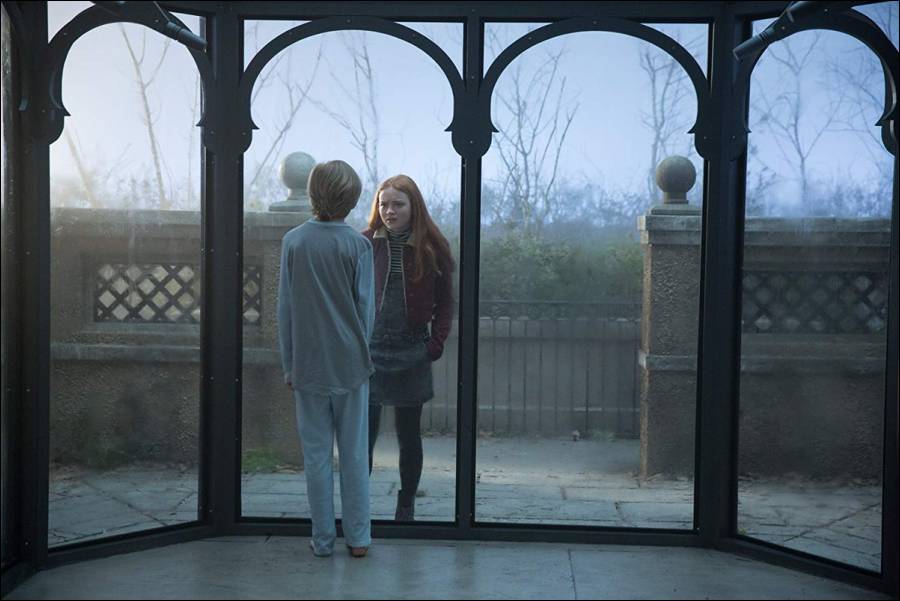Taglines: What she saw changed everything.
Abby Johnson’s story begins with both her personal desire for abortion services and her conversations with a Planned Parenthood recruiter on her campus. Abby decides to volunteer from time-to-time. Believing Planned Parenthood’s positions, such as “the fetus can’t feel any pain”, Abby slowly becomes a strong supporter of the mission, despite her Mom’s strong anti-abortion position.
After volunteering for awhile, Abby decides to take a paid position. Shortly after, the Clinic Director begins to see something extra in Abby. When the time comes to take on one of the hardest tasks in the clinic, Abby surprises the Clinic Director by staying steady when separating and accounting for all of the body parts of an aborted baby.
After the Clinic Director receives a promotion, she promotes Abby, making her the youngest ever Planned Parenthood Clinic Director. Abby excels at her job, including pressuring pregnant women to agree quickly to abortion by telling them the cost of their abortion increases the longer they wait. Her passion for the work shows as she keeps the clinic open during an approaching hurricane. Planned Parenthood recognizes her talents with their employee of the year award. Her passion changes after two significant events.

First, Planned Parenthood decides they need more profits and doubles the expectations for the number of abortions. Abby points out the conflict with the new emphasis on the quantity of abortions and Planned Parenthood’s stated mission statement. Admonished for “lack of loyalty”, she returns to her clinic. Second, an abortion doctor calls on Abby to assist with following the abortion on an ultrasound.
This first-ever experience shakes her to her core when she sees the unborn child fighting to avoid the suction. Abby realizes the baby’s will to live as it fights for his/her life. Now shattered, Abby decides to quit and volunteer to help the anti-abortion group that appears outside of her clinic at times. Not the end of the story. Planned Parenthood decides to attack her in court. Her attorney shows the suit as clearly groundless in the hearing. Ultimately, Planned Parenthood closes the clinic.
Unplanned is a 2019 American anti-abortion[3] drama film written and directed by Cary Solomon and Chuck Konzelman. It is based on the disputed memoir Unplanned by Abby Johnson. The film stars Ashley Bratcher, Brooks Ryan and Robia Scott, following Johnson’s life as a clinic director for Planned Parenthood and her subsequent transition to anti-abortion activism.
The film was theatrically released in the United States by evangelical Christian production and distribution house Pure Flix on March 29, 2019. The working title was Redeemed, and details of its subject were kept from the public in order to minimize protests by abortion rights advocates. Some TV channels refused to air ads for the film due to its subject matter. The film grossed $21 million worldwide on a $6 million budget. The accuracy of the film’s portrayal of abortion and of Planned Parenthood have been severely criticized by doctors and advocates for Planned Parenthood.
Film Review for Unplanned
Unplanned opens with one truth and one lie, both unintentional. In a sunny voiceover, the film’s hero, the American anti-abortion activist Abby Johnson, informs the audience that “my story is not a neat and tidy one. In fact, it’s probably going to make you squirm a bit.”
The first half of that narration requires a correction. Johnson’s real-life story, adapted here from her own memoir, is presented in a remarkably neat and tidy fashion. Simply put, the anti-abortion activist is right, and everyone who thinks otherwise is wrong and responsible for the “dehumanization” of the modern world.
But I’ll give Johnson a point for the squirming: Unplanned will make you writhe in agony over how such an ugly, malicious and potentially dangerous piece of religious and political propaganda could have made its way into this world.
If Unplanned were merely preaching to the converted – as is the case of its U.S. distributor Pure Flix’s other “faith and family” titles – then it would only be a bothersome nuisance. Just another treacly, prayer-driven affair like Do You Believe?, In the Blink of an Eye and the God’s Not Dead series – cheap, relatively harmless pseudo-movies that rarely escape the evangelical market. But Unplanned is designed to go further than that. The writing and directing team of Chuck Konzelman and Cary Solomon use their slickly produced and handsomely shot film to spread outright lies that could endanger the health of women.
In a climate in which the rights of women are being actively rolled back – where the U.S. Vice-President can be confident enough in this newly enabled hostility that he can tweet his support for an anti-abortion film – this movie feels particularly weaponized. In multiple U.S. states, governments are pushing to restrict access to abortion, and succeeding. Sometimes, as in Alabama, even pregnancies that are the result of incest or rape cannot be legally terminated. With Unplanned, these laws are glorified through the undeniable power of the cinematic medium, lending a romance to the anti-abortion movement that the law alone cannot provide. And like all bad movies, Konzelman and Solomon’s work strips away nuance and complication in favour of something that feels like a moral triumph, when in fact it denies the countless lives ruined and even ended by these retrograde laws.
The film opens with Johnson (a wooden Ashley Bratcher, familiar to the faith-forward film circuit for her roles in War Room and 90 Minutes in Heaven) enjoying her career as a Planned Parenthood director in Texas. Her sunny days are filled with feminism-first energy and little patience for the protesters gathered outside her clinic. Until, that is, the moment she helps participate in an on-site abortion for woman who’s 13 weeks pregnant. It’s during this procedure, shot like a horror film, where Johnson not only watches in terror as a doctor makes a “Beam me up, Scotty!” joke while his patient cries in pain, but becomes transfixed by an ultrasound display showing a fetus fighting for its life.
Never mind that Texas Monthly has questioned whether this abortion, which Johnson cites as a perspective-flipping moment, even took place. Just know that the scene, as dramatized, is a fiction. According to the American College of Obstetricians and Gynecologists, fetuses are unable to perceive pain, let alone perform such purposeful resistance movements, until at least 24 weeks’ gestation. Yet Konzelman and Solomon have their on-screen fetus fight off the doctor’s cannula like the doomed victim of Jason Voorhees.
Planned Parenthood, meanwhile, is brazenly sketched as a greedy for-profit behemoth whose bottom line relies on selling abortions, with one villainous character hissing to Johnson that “abortion is what pays for your salary, abortion is what pays for all of it!” Yet the organization, which has decried Unplanned’s “many falsehoods and distortions,” is in fact a non-profit whose abortion services account for just 3.4 per cent of its mostly free sexual and reproductive health treatments, according to its 2017-18 annual report.
When Unplanned isn’t making PP’s doctors look like ghoulish supervillains, it’s busy making abortion itself akin to Grand Guignol-esque torture-porn, with zonked teenage girls (almost every patient here is a young, innocent, white teen or co-ed) covered in copious amounts of blood. It’s either that, or they’re going into shock thanks to the clinic’s incompetence. In reality, a first-trimester abortion is one of the safest medical procedures in the United States, with major complications occurring less than 0.5 per cent of the time.
The naked hostility toward women’s bodies goes on and on – with a bonus anti-Semitic dog-whistle to George Soros obsessives – but Unplanned is not only a crass right-wing manifesto. It is also a potentially dangerous call to extremism.
At one point in the film, Johnson learns of the 2009 murder of Kansas abortion provider George Tiller. This would be a prime opportunity for the filmmakers to disavow such violence, but Unplanned merely shrugs. Johnson, at this point in the story still on the wrong side of morality, gets a quick line where she’s aghast that someone could shoot a man in the head “at church!”, but barely anyone else says a peep.
Later on, Johnson befriends a kindly, clean-cut anti-abortion protester who casually likens Planned Parenthood’s activities to slavery and the Holocaust. At another point, Johnson, now fully converted to the anti-abortion cause, is tempted to assault a former Planned Parenthood colleague. “Is it wrong if i want to go over there and punch her in the face?” she asks her husband, who replies: “Yes, it’s wrong. That’s my job.”
Who, the filmmakers seem to be asking throughout Unplanned, would dare sit on their hands knowing what hell was raging inside Planned Parenthood’s doors? The film never explicitly asks its audience to meet violence with violence, but it doesn’t exactly instruct the righteous to forgo such tactics, either. Consider the title card placed at the end of the film: “Your life matters. If you’re a woman or a man who wants to talk with someone about your abortion, your pregnancy, or taking action to support life … text HOPE to 73075.” Whose life, then, doesn’t matter? And though Unplanned never asks this, I will: What action might some of the film’s more intellectually susceptible audiences be inspired to take?
Which leads to the question of whether exhibitors should be hosting such a work. Cineplex, which will screen Unplanned in 14 theatres across the country starting on Friday, has defended its programming decision, passing the buck to provincial film review boards and the whims of the market. “It is up to each of us to decide whether or not we want to see it,” Ellis Jacob, chief executive of Canada’s largest exhibitor, said in a statement this week. “In Canada, we have that option and I think it is an important thing to remember.”
On the one hand, audiences should be able to freely access Unplanned, if only to witness how confidently polished this type of evangelical cinema has become – and to discover what kinds of films are being applauded by those with the power to change the law.
Anti-abortion rhetoric values the life of the fetus over the right of a woman to decide what to make of her life, of her body. Those who want to deny women abortions may genuinely believe a murder is taking place, or they may just be driven to control women’s bodies. Either way, the issue is deeply complicated – far more so than Unplanned would ever deign to admit. Fundamentally, though, this movie suggests, through fictionalization and manipulation, that cruelty lies behind the act of abortion, rather than a deep respect for the uncomfortable choices women sometimes have to make.
Would Cineplex, or Landmark, or the handful of independent theatres hosting Unplanned this weekend, program a film that specifically mounts a campaign to roll back the rights of one race, or ethnicity, or sexuality? Women’s rights, it appears, are cheaper and easier to ignore. Give it to Unplanned for revealing one undeniable truth.
Unplanned (2019)
Directed by: Chuck Konzelman, Cary Solomon
Starring: Ashley Bratcher, Brooks Ryan, Robia Scott, Jared Lotz, Emma Elle Roberts, Tina Toner, Sarah Hernandez, Robin DeMarco, Maura Corsini, Robert Thomason, Andee Grace Burton
Screenplay by: Chuck Konzelman, Cary Solomon
Production Design by: Chris Rose
Cinematography by: Drew Maw
Film Editing by: Parker Adams, Dana B. Wilson
Costume Design by: Anna Redmon
Set Decoration by: Jennifer Herbel
MPAA Rating: R for some disturbing/bloody images.
Distributed by: Pure Flix Entertainment
Release Date: March 29, 2019
Visits: 61





